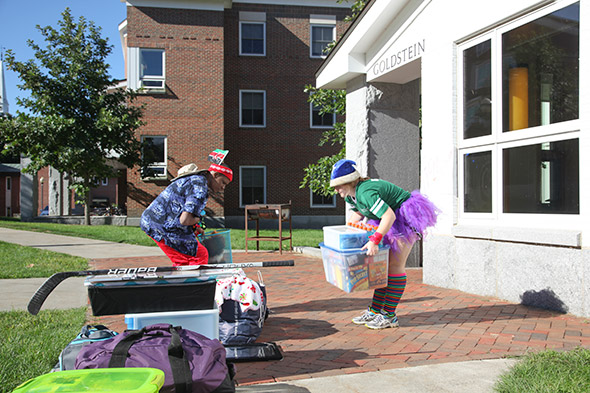
- About
- Departments & Services
- Projects
- Construction in Progress
- Service Requests
- News & Communications
Back to Top Nav
Back to Top Nav
Back to Top Nav
Dartmouth students have three new residences designed as learning communities to consider this fall when deciding where to live, as well as 10 design-your-own communities, set up as blocks of rooms interspersed within general campus housing.

Two Undergraduate Advisors help first-year students move into Goldstein Hall, which is part of the McLaughlin Cluster. The new Global Village community is based in the Cluster. (Photo by Corinne Arndt Girouard)
These new options, in addition to the 12 existing affinity communities—such as East Wheelock, the Shabazz Center, and the Chinese Language House—build on the College's mission of enhancing campus housing options by linking them to Dartmouth’s academic mission, says Mike Wooten, director of residential education.
"The vision for residential life at Dartmouth is that it be integrated with the larger mission and intellectual goals of the College," Wooten says. "Our students deserve to expect that every part of their experience is directed toward their intellectual, social, and personal development."
More than 200 incoming 18's and a total of nearly 1,000 Dartmouth undergraduates applied to live in living/learning communities this fall, Wooten says. In the long term, the College is continuing the work of envisioning a campus-wide system of residential communities drawing on the house and residential college systems that exist at some peer institutions. The idea was first sketched out by President Phil Hanlon '77 and then-Trustee Chair Steve Mandel Jr. ’78 in the spring.
Among the advisors for the Global Village are Steve Silver, director of International Student Programs; Jim Dorsey, associate professor of Japanese; Tania Convertini, director of the French and Italian Language program; and Amy Newcomb, student program officer of the John Sloan Dickey Center for International Understanding. The global village will host programming, events, and possibly seminars in the cluster, organized by students and advisers. In the winter term, Wooten says they are developing a writing class with Christiane Donahue, director of the Institute for Writing and Rhetoric, to be taught in the cluster.
Triangle House will promote the development of thoughtful and responsible scholars, activists, and community leaders, and will host in-house and community programming for the Dartmouth community. Reese Kelly, director of the Center for Gender and Student Engagement and interim director of the Office of Pluralism and Leadership, is the staff adviser for Triangle House. Brianne Gallagher, a post doctoral fellow from the Gender Research Institute at Dartmouth (GRID), will have an apartment in the house and serve as a live-in adviser. In addition, Francine A'ness, assistant dean of undergraduate students and a lecturer in Women's and Gender Studies, is developing a writing class to be taught in Triangle House in the winter term.
"Not only is Triangle House a great example of living and learning communities at Dartmouth, it is also a hugely symbolic project that represents Dartmouth's commitment to inclusivity," says Kelly. "Our LGBT Alumni/ae Association, DGALA, has played a significant role in making the house a reality from advocating for its existence over the years to spearheading a fundraising campaign for construction and programmatic costs."
"Teaching and learning is a deep strength of Dartmouth," says Wooten. "And that is integral to what it means to be in community here."